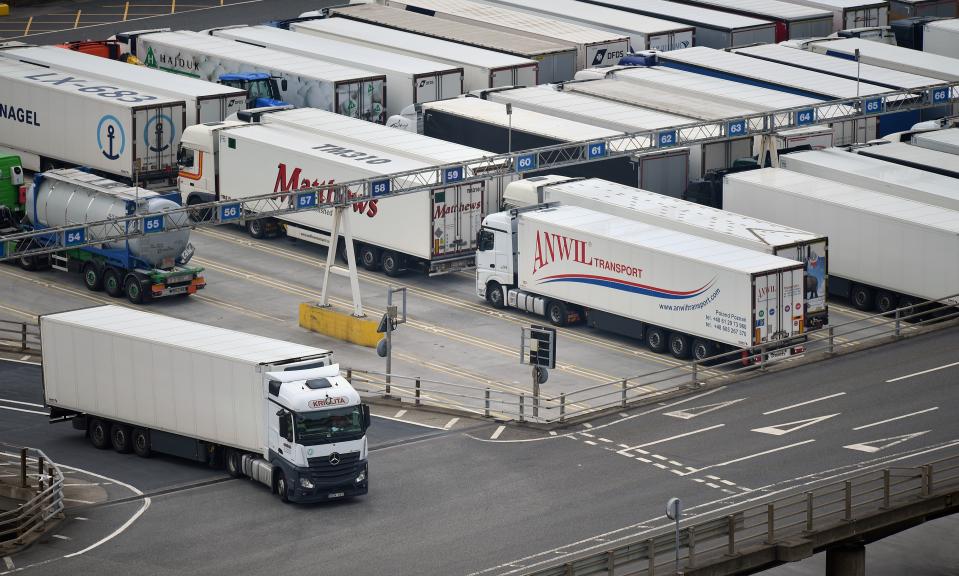UK watchdog warns of 'significant' Brexit border disruption

Britain’s trade with the EU will face “significant disruption” when the Brexit transition ends, irrespective of a trade deal, a spending watchdog has warned.
The National Audit Office (NAO) said that the coronavirus pandemic has thwarted preparations for the new border controls. This meant there was a “high risk” traders would still not be ready when the new measures kick in.
The government has left itself little time to mobilise its new trader support service, which will help businesses moving goods between Great Britain and Northern Ireland, the report said.
The controls are due to come into place on 1 January, the day after the transition period ends.
Warnings that the new systems might not be ready on time to avoid disruption come as preparations are already underway to prepare for the border changes.
NAO, added that the government had still not taken the steps to ensure there were enough customs agents, seen as “vital” in helping companies navigate the system.
The watchdog also warned "limited" time remained for UK ports to test new IT systems.
Traders face new hurdles, such as filling in customs declarations on goods being traded, even if the UK agrees a deal with Brussels. HM Revenue and Customs (HMRC) estimates it may need to process 270 million customs declarations from 2021, compared with 55 million currently.
According to the government’s latest “reasonable worst case planning” figures, between 40% and 70% of lorries transiting between the EU and the UK may still not be ready for the new border controls by 1 January.
In September, ministers warned hauliers they could face queues of up to 7,000 lorries at the main Channel crossings.
The report says that arrangements to minimise delays will depended on new technology and requires the effort from both trades and hauliers. It warned there was little time left for ports to integrate their systems and processes with new government systems, and that they may have to fall back on “manual processes.”
NAO added that HMRC still needed to make significant changes to its customs systems to handle the increase in customs declarations, even though it had known this was likely since planning for a no-deal Brexit began in 2017.
Yahoo Finance has reached out to the government for a comment.
READ MORE: Brexit: Government warns of 7,000-truck-long queues at Dover
NAO also raised concerns about the checks that will be required for goods moving to Northern Ireland from the rest of the UK.
Under the UK's withdrawal deal, Northern Ireland is due to enforce EU customs rules at its ports, requiring declarations for goods coming from Great Britain.
Northern Ireland’s Department of Agriculture, Environment and Rural Affairs (DAERA) — which is responsible for checks on agri-food products — had been “severely hampered” by the ongoing trade talks with EU.
The watchdog added that DAERA lacked “clarity” over the measures required.
As a result, DAERA had concluded it would not be possible to complete the necessary work on its systems and infrastructure by 1 January. It said it is exploring “contingency options.”
In June, the government said that it would phase in new checks on EU good entering the UK over six months from January 2021 to give firms "time to adjust.” But, NAO auditors said there was still "uncertainty" over where new border infrastructure would be located and whether it would be ready.
Auditors also warned that "limited" time remained for UK ports to test new IT systems.
At the same time COVID-19 made, civil contingency plans to maintain the supply of medicines and other critical goods, including acquiring extra freight capacity away from the main Channel crossings — more difficult to enact.
The head of the NAO, Gareth Davies, said: “The January 1 deadline is unlike any previous EU exit deadline — significant changes at the border will take place and government must be ready.
“Disruption is likely and government will need to respond quickly to minimise the impact, a situation made all the more challenging by the COVID-19 pandemic.”
Watch: What is a no-deal Brexit and what are the potential consequences?

 Yahoo Finance
Yahoo Finance 